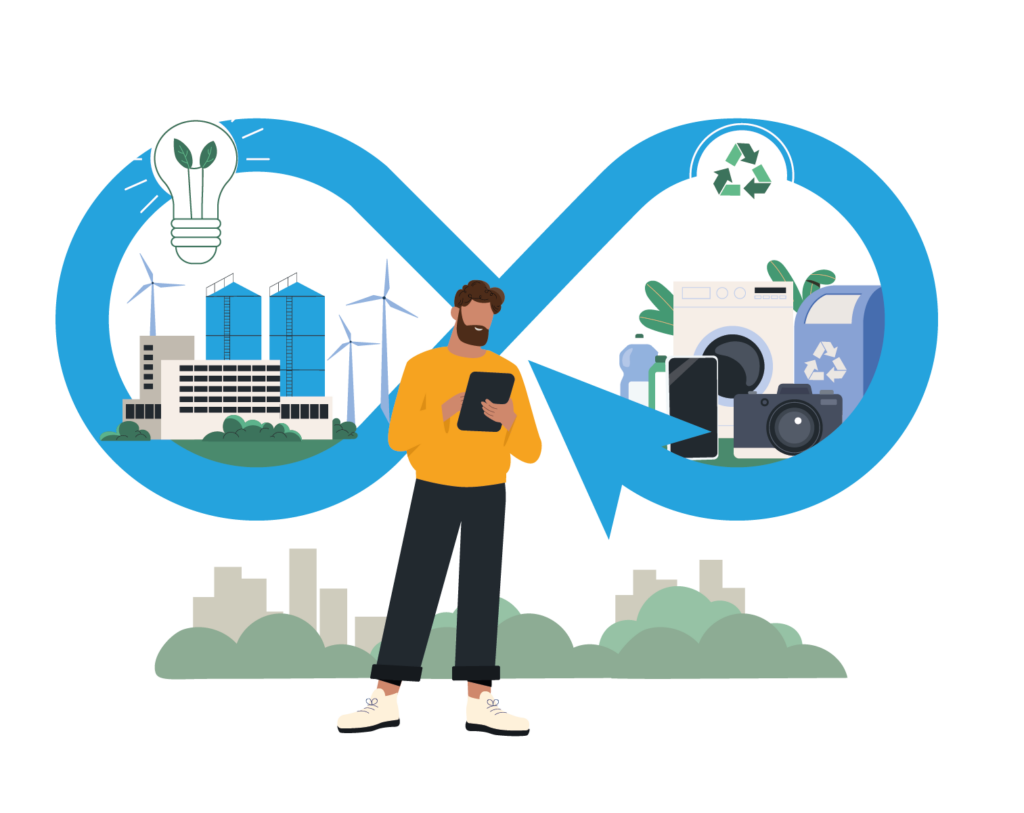How to improve sustainability in property management
At a time when environmental consciousness is paramount, property managers play a crucial role in shaping sustainable living spaces and communities. Whether operating within residential complexes, commercial buildings or mixed-use developments, improving sustainability is not only necessary for the sake of the climate but also delivers significant business benefits, such as driving value and enhancing tenant satisfaction.
In this post, discover 10 tips for sustainable property management, from green leases to eco-friendly upgrades and learn how it saves costs and attracts tenants.
What is sustainable property management?
Sustainable property management entails integrating environmentally responsible practices throughout a building’s lifecycle, from construction to ongoing operations and maintenance.
During construction, this involves incorporating green initiatives like renewable materials and energy-efficient technologies. In operations, it means prioritising energy and water conservation, along with waste reduction. Often, the use of property management software can help to optimise operations for sustainability.
By focusing on sustainability, property managers can realise cost savings, improve resident satisfaction and contribute to a greener future.
10 tips to improve property management sustainability
As technology develops, real estate sustainability trends become more effective and more advanced. While exploring the benefits that new developments can deliver, it’s also important to ensure that foundational sustainability practices are in place, such as ensuring stakeholders are informed and educated and installing LED lighting. Our 10 tips for improving sustainability include both new and emerging technology as well as tried and tested, high-impact ways to enhance a portfolio’s ecological credentials.
1. Implement green leases
Green leases are specialised lease agreements, primarily associated with commercial properties, that go beyond traditional lease clauses to incorporate environmental sustainability commitments. These leases signify a mutual commitment by both landlords and tenants to operate a building in an environmentally responsible manner. They typically include provisions related to energy efficiency, water conservation, waste reduction, sustainable materials and eco-friendly transportation options. Green leases aim to minimise the environmental footprint of buildings, reduce operating costs and contribute to a more sustainable future.
2. Install energy-efficient systems
Investing in energy-efficient systems offers a double win: reduced environmental impact and significant cost savings.
Lighting: Switch to LED bulbs and smart lighting systems for significant energy reductions. LEDs use less energy and last longer, minimising costs and maintenance.
Appliances: Opt for energy-efficient models when replacing appliances like fridge/freezers, washing machines and tumble dryers. They consume less energy without compromising performance, lowering utility bills for everyone.
HVAC: Install smart thermostats that adjust temperatures based on occupancy and climate. This reduces energy waste while ensuring comfortable indoor environments and minimising utility costs.
By prioritising these upgrades, you’ll contribute to a greener future and enjoy long-term financial benefits.
3. Have an effective recycling system
Having an effective recycling system not only reduces waste sent to landfills but also fosters environmental responsibility among tenants and staff. Property managers can encourage recycling by providing designated bins conveniently located throughout the property, with clear designations for rubbish, recyclables and compost.
Informing tenants about local recycling programmes and initiatives further incentivises proper recycling and contributes to community-wide sustainability efforts. Additionally, organising educational sessions or distributing informational materials about proper sorting and disposal methods helps instil effective recycling habits among both staff and tenants. This includes guidance on what items can be recycled, how to prepare recyclables for collection and the importance of reducing contamination.
4. Perform routine maintenance
Sustainable maintenance practices, like regular inspections and timely repairs, can lower operational costs by preventing breakdowns and reducing energy consumption. By maintaining building systems and assets, property managers optimise energy efficiency, leading to lower utility bills and an eco-friendlier operation.
Promptly addressing maintenance issues enhances tenant satisfaction and retention rates by ensuring comfortable and safe living spaces. Additionally, routine maintenance promotes health and safety by identifying and mitigating potential hazards in HVAC, plumbing and electrical systems, creating a secure environment for tenants and staff.
5. Conserve water
Water conservation is crucial for sustainability. Property managers can install sustainable fixtures like low-flow toilets and motion sensor taps to minimise water usage, as well as implement harvesting systems for alternative water sources, like greywater and rainwater, to reduce reliance on public water supplies.
Educating tenants on water conservation habits, such as taking shorter showers and turning off taps when not in use, encourages active participation in conservation efforts. While, investing in monitoring technologies, such as smart water meters, enables real-time tracking of usage and facilitates proactive water management strategies.
6. Invest in solar panels
Investing in solar panels presents an opportunity for property owners to harness clean energy and contribute to reducing their carbon footprint. While the initial costs may be substantial, the long-term benefits are considerable, primarily through lower energy bills.
Moreover, various governments and utility companies provide incentives, rebates and tax credits to offset the upfront expenses, making solar panel installation a financially attractive option.
Beyond immediate financial gains, residential properties equipped with solar installations tend to sell faster and at higher prices. These homes are not only perceived as eco-friendly but also offer long-term cost-effectiveness, enhancing their appeal as investments for future buyers.
7. Fix any draughty windows or cracks
Ensuring that windows are properly sealed and addressing any draughty areas or cracks promptly is crucial for maintaining energy efficiency within a property. Property managers should prioritise regular maintenance to ensure that windows are well-insulated, and any cracks in the glass or framework are promptly repaired.
Additionally, encouraging tenants to close and lock their windows when running heating or air conditioning can further enhance energy conservation efforts.
Implementing insulating materials such as curtains, blinds or shades can also improve the efficiency of windows by minimising heat loss or gain and blocking unwanted sunlight, thus contributing to overall energy savings.
8. Educate tenants on sustainable practices
Sustainable property management is a win-win approach that benefits the environment, property owners and tenants. By empowering tenants with knowledge and offering incentives, property managers can cultivate a sense of community responsibility that benefits both the planet and the business.
Consider hosting informative workshops and events focused on energy efficiency, water conservation and recycling practices. These interactive sessions equip tenants with practical tools and knowledge to seamlessly integrate greener practices into their daily lives.
Additionally, ensure that tenant welcome packs contain comprehensive information regarding appliances, energy usage guidelines and waste disposal procedures.
9. Use native plants in landscaping
Utilise native and drought-resistant plants in landscaping to promote sustainability. Opt for plants that require minimal watering and maintenance, reducing water consumption and preserving resources. Incorporate natural alternatives where possible, such as compost and organic pest control methods to minimise environmental impact. By prioritising native flora and sustainable practices in landscaping designs, property managers can enhance biodiversity, conserve water and create eco-friendly outdoor spaces.
10. Encourage sustainable transportation options
Foster a greener future for your property and attract eco-conscious tenants by prioritising sustainable transportation initiatives:
Embrace EVs: Install electric vehicle charging stations to cater to the growing EV market and showcase your commitment to sustainability.
Optimise deliveries: Advocate for combined deliveries and partner with green suppliers to minimise traffic and emissions.
Promote active commuting: Provide shower facilities for cyclists and pedestrians, encouraging healthy choices and reducing car reliance.
Why strive for sustainable property management?
Save money on energy and water bills
By replacing old, inefficient appliances with new energy-saving models, property managers can help tenants lower their electricity and water bills, resulting in increased affordability and tenant satisfaction.
Additionally, integrating smart building technologies enhances energy efficiency, leading to reduced utility expenses and maintenance costs over time. Embracing sustainable practices not only contributes to financial savings but also demonstrates environmental responsibility and positions the property as a leader in the transition to a greener future.
Attract eco-conscious tenants
Sustainable properties offer a range of benefits that appeal to eco-conscious renters, including lower energy and water bills, enhanced air quality, increased levels of internal comfort and more aesthetically pleasing living spaces. These features not only align with tenants’ values but also contribute to a higher quality of life. As a result, eco-conscious tenants are more likely to commit to longer-term lease agreements, providing property managers with stability and consistent rental income. By prioritising sustainability, property managers can attract and retain tenants who value environmentally responsible living, ultimately enhancing the desirability and marketability of their properties.
Reduce environmental impact
Striving for sustainable property management is essential for reducing environmental impact and achieving ESG (Environmental, Social and Governance) and Net Zero targets. By implementing green initiatives such as energy-efficient systems, water conservation measures and waste reduction strategies, property managers can minimise the environmental footprint of their properties and contribute to a more sustainable built environment.
Additionally, sustainable practices support the health and well-being of occupants by improving indoor air quality, enhancing comfort levels and promoting a healthier living environment. By prioritising sustainability, property managers not only fulfil their corporate social responsibility but also create healthier, more resilient communities for residents and occupants, ultimately driving positive societal and environmental outcomes.
Energy Management Software
Gain total visibility and take full control of your energy consumption.

FAQs about sustainability in property management
How MRI Software can help your business to drive sustainability
At MRI Software, we’re passionate about helping you leverage technology to meet sustainability targets and drive greater operational efficiencies. MRI’s powerful energy management software technology provides a strong foundation for organisations to create sustainable, energy efficient spaces. With all FM data in one place, its facilities management software enables property managers to make informed decisions and ensure that planned and reactive maintenance is completed on time, to budget and is compliant.
Contact us today to find out more about how our energy and sustainability solutions can accelerate your vision for sustainability.
Strategies for success: Achieving FM and energy team synergy
Your journey to achieving true FM & energy team synergy begins here. 3 in 4 senior decision-makers in large businesses across the UK consider energy their #1 risk in 2023, according to the latest ‘Drivers of Change’ research from Prot…
